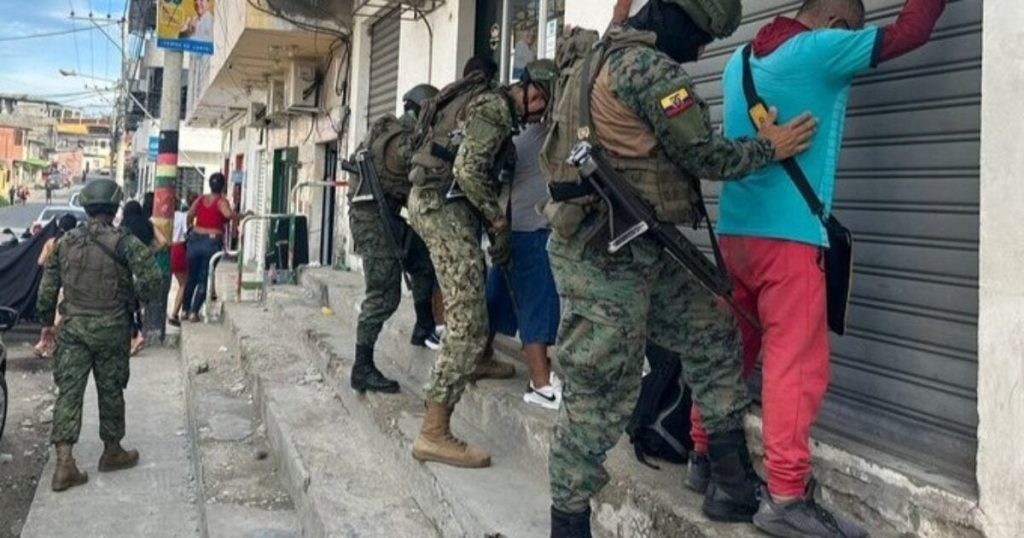The Ecuadorian Armed Forces conduct military reconnaissance and surveillance operations as part of the country’s strategy against violence and transnational and local organized crime, on April 18, 2023, in Guayaquil. (Photo: Ecuadorian Armed Forces)
In response to the US drug crisis which is claiming 200 American lives daily, the Biden Administration vows to cooperate with the Mexican government. A statement from the White House Office of National Drug Control Policy (ONDCP) regarding tackling Mexico’s cartels asserts, ‘In close coordination with the Government of Mexico and by leveraging President Biden’s Executive Order, we will continue to take aggressive action and exercise global leadership to strike drug trafficking organizations.’”
Taking down the cartels is crucial, given their involvement not only in narcotrafficking and money laundering but also in the surge of illegal immigration at the southern border, having gained control over the lucrative human trafficking trade. However, collaborating with the Mexican government won’t yield results. The White House statement is far from reality, given the firm grip of the cartels on the Mexican government. With escalating cartel interference in elections, prospects for change appear bleak.
Next month, Mexico will hold its general elections, but the cartels have made this year’s campaign season one of the bloodiest in history. Gisela Gaytan, a mayoral candidate from the small town of Celaya, was killed on the very first day of her campaign. Assassins shot her just after she descended from the podium, after pledging to combat cartel violence for her constituents. Magdalena Rosalez, who is running for Congress representing the same party as Gaytan, was asked by her party to abandon her campaign because of security concerns. The grim reality is that Gaytan’s murder, like most murders in Mexico, will remain unsolved and unpunished.
Democracy in Mexico is severely compromised by the cartels, whose influence has infiltrated the legislation, the judiciary, the military, police, and even the electoral process. In certain regions, the cartels handpick candidates and eliminate opposition through threats, violence, or murder. The situation is so extreme that in some elections, cartel-backed candidates run unopposed.
So far this year, approximately 30 candidates have been assassinated, with hundreds more intimidated into withdrawing from the race. Candidates face danger not only during public appearances but also every minute of every day. Consequently, 400 candidates have petitioned the government for security protection.
The cartels aim to install candidates in office who would align with their interests. Additionally, they seek to influence the selection of police chiefs, mayors, and other local officials. Furthermore, cartels are expanding their revenue sources by seizing control of municipal construction projects, including roads, schools, and hospitals.
President Andrés Manuel López Obrador, whom Biden is pinning his hopes on, denies assertions of violence even in Chiapas, a city synonymous with cartel rule. This is despite the fact that his own protege, presidential front-runner Claudia Sheinbaum, was recently halted and threatened by cartel gunmen.
In some parts of the country, cartels control access to towns, deciding who can enter or leave and what they can do while there. And the violence isn’t just limited to cities; even small towns like Maravatío, located in Michoacan with a population of only 80,000, have seen the assassination of three mayoral candidates. Two of the victims were from the same party as President Obrador, yet he denies that the electoral process is being impeded by violence.
In Chiapas, almost two dozen mayoral candidates from the PAN party have withdrawn from their races. According to a party member, while cartels previously influenced elections by buying off voters, they now resort to violence, either by killing candidates or forcing them out through threats.
The northern border, adjacent to the US, has long been notorious for its lawlessness and prevalence of crime and vice. However, the violence and crime are now spreading throughout the entire country. Historically, Mexico’s southern border was loosely guarded and relatively peaceful, but it has transformed into a transit point for Colombian cocaine smuggled through Guatemala. Today, Chiapas is one of the most affected states, where human trafficking, alongside narcotrafficking, has become a major source of income, with cartels aligning themselves with political parties. Numerous cartels operate in the region, including the two largest ones, the Sinaloa and Jalisco New Generation cartel (Cártel de Jalisco Nueva Generación or CJNG). Consequently, murders and disappearances have skyrocketed, with six political candidates among the recent casualties.
Biden is hoping that by partnering with the Mexican government, he can take on the cartels. This makes little sense given that the cartels control the Mexican government.
The post Cartels’ Grip on Mexican Elections: Government Will Not Stop Drugs to US appeared first on The Gateway Pundit.





